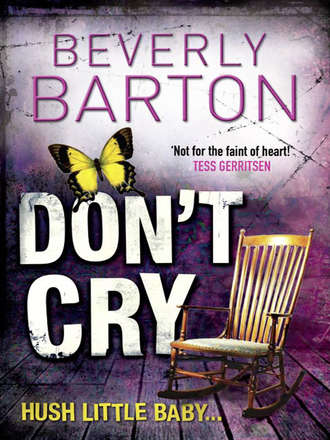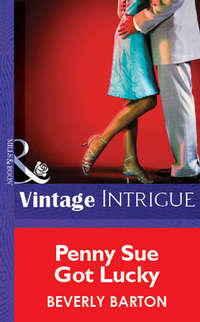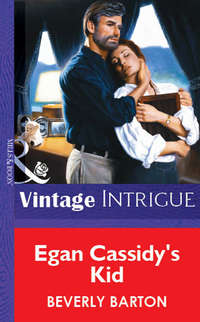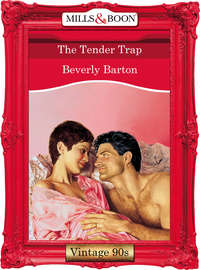
Полная версия
The Mother
J.D. came up beside Audrey. “Looks like our dates are ignoring us.” He held out his hand. “Would you care to dance, Dr. Sherrod?’
Audrey hesitated for half a second. “I … uh …”
“It’s just a dance, not a lifetime commitment,” he said jokingly.
“Thank you, Special Agent Cass, I’d love to dance.”
She took his hand and he led her onto the dance floor.
“My name’s J.D.,” he told her as he slipped his arm around her.
“I’m Audrey.”
“Now, that wasn’t so hard, was it?”
“What?” She eyed him quizzically.
“Our getting on a first-name basis.”
“Are we playing some sort of game, J.D.? If we are, clue me in.”
He chuckled, and damn it, she liked the sound. Deep and robust and genuine.
“You have a nice smile,” he told her.
She hadn’t even been aware that she was smiling. “Do you always flirt with every woman you meet?”
“Who says I’m flirting?”
“Isn’t that what you’re doing, flirting with me because you’re aggravated that your date is distracted by her boss and coworker?”
He chuckled again, as if he found her comment highly amusing.
Audrey felt a flush of heat warm her from head to toes. She hoped her sudden awareness of just how close her dance partner was holding her didn’t show on her face.
“You’re an open book,” Tam had once told her. “Everything you’re feeling shows on your face.”
“Holly and I don’t have that kind of relationship,” J.D. said.
“What kind is that?”
“The kind where I’d be aggravated or jealous that she’s ignoring me in favor of spending time with her boss and her coworker.”
“Then you two aren’t seriously involved?”
“I’m never seriously involved. Not since my divorce six years ago. What about you—are you and Beau Brummell engaged, going steady, or just sleeping together?”
Audrey laughed spontaneously, thoroughly amused by J.D. dubbing the fastidious Porter with the name of the best-known dandy of all time.
“Porter and I are not engaged,” she said. “And we’re a little too old to go steady. Besides, I think that term is passé, but I have no idea what teenagers call it these days.” She gave her last statement several moments of consideration before saying, “And whether or not we’re sleeping together is none of your business.”
J.D. grinned.
Damn if the man wasn’t dangerously sexy. And he probably knew it. Guys like that always did, didn’t they?
“You’re absolutely right,” he said. “It would be my business only if you and I were—”
“And we are not!” Audrey, Audrey, why did you finish the man’s sentence for him? Why such an adamant statement of fact?
With that damn sexy smile unwavering, he agreed. “No, we aren’t.”
As if on cue the music stopped, the dance ended, and J.D. led her off the dance floor. She pulled away from him.
“I’m going to find Willie and wish—”
Too late. The waiters wheeled out an enormous six-tier cake placed in the center of a serving cart and the band played “Happy Birthday.” The partygoers, including Audrey and J.D., joined in the song. As the well-wishers crowded together around the guest of honor, J.D. eased his arm around Audrey’s waist. Ambivalent feelings toward the man warred inside her and a damn army of butterflies did a war dance in her belly.
Debra didn’t know if it was daylight or dark outside in the real world. Here in the macabre otherworld in which she existed, it was always night. It could be twelve noon or twelve midnight for all she knew. It could be Monday or Friday. Perhaps she had been here for a week, or it could have been a month.
What did it matter?
“Rock him to sleep,” the voice told her. “Lovingly. Tenderly. He needs a mother’s gentle touch.”
She held the bundle in her arms and immediately began crooning the lullaby she knew he expected her to sing to the object wrapped in the soft blue blanket. How many times had they repeated this ritual? Dozens? Hundreds? She had lost count. Odd how rocking and singing to the skeleton of a small child had become a routine, one she no longer viewed with utter horror. Her entire world was now confined to this small space, an area with hard floors and walls too distant to see in the semidarkness in which she now lived. As far as she knew, the rocking chair where she was confined was the only piece of furniture in the room.
He had not harmed her, at least not physically. He kept her feet loosely bound so that even when she was allowed to move around, she had to hobble. And whenever he left her, he tied her wrists to the chair arms. He brought her food and water. He allowed her to wash herself and even brush her hair; and he provided an old-fashioned slop jar for her to use. But the indignity of having to bathe in front of him and even relieve herself with him standing nearby had added to the emotional trauma she had endured every moment of her captivity.
In the beginning, she had been afraid that he would rape her, but it soon became apparent that his reasons for abducting her and holding her prisoner had nothing to do with sex. Then she’d wondered if he would eventually torture her. He hadn’t. But the psychological torment was just as bad as physical torture would have been, perhaps worse.
She felt him move away from his stance behind the rocker, where he always stood when she performed. And that’s what it felt like—a performance. Where was he going? His leaving while she still held the blanket-wrapped bundle was not part of the normal routine.
Her voice momentarily faltered.
“Keep singing,” he told her.
She continued with the lullaby, repeating the words over and over, making up new verses as she went along.
Within minutes, he came up behind her again, but instead of standing guard over her, he reached around her and laid a small pillow across her lap. Since that first time when he had placed what she had thought was a doll in her arms, she had avoided glancing down at it, but she looked at her lap, at the age-yellowed white satin pillow trimmed with tattered blue ribbons. It was a baby’s pillow.
“Do what you know you must do,” he said.
“I don’t understand.”
“You must send him to heaven where he’ll be one of the little angels.”
“What? I don’t know what you mean. What do you want me to do?”
“Pick up the pillow.”
She did.
“Lay it gently over his face.”
She did.
“Hold it there and keep singing and rocking him until he goes to sleep.”
Until he goes to sleep?
Realization dawned. Until he’s dead.
“You want me to smother him?” she asked.
“You don’t want him to suffer any longer, do you?”
She lifted the pillow and placed it over the bundle she held.
“It’ll all be over soon,” the man’s voice whispered softly … sadly.
Believing he meant the make-believe child in her arms would soon stop breathing, she felt a sense of immediate relief when he lifted the pillow, put it in her lap, and took the bundle from her. For now, it was over. He would tie her wrists to the chair and leave her here. Until the next time.
In the beginning, she had tried to get away from him, but each time he’d caught her before she had gotten more than a few feet. After being shoved onto the floor, face down, several times, she had stopped trying to escape.
She waited there in the rocking chair, waited for him to tie her wrists to the arms and then leave her. But when he reached around her from behind, there were no ropes in his hands.
Instead, he lifted the pillow from her lap and brought it up and over her face. She didn’t realize what he intended to do, not until he pushed the pillow against her face and held it there.
Chapter 4
Audrey had spent a restless night, tossing and turning, waking every hour or so from the time she had finally fallen asleep at midnight until a few seconds ago when she had shot straight up in bed. She glanced at the bedside clock—5:40 A.M.—and groaned. Damn it, she’d been dreaming. Crazy dreams. The kind that didn’t make any sense, but that were nevertheless all too real and somewhat unnerving. As a child, she had been prone to nightmares, especially after Blake’s disappearance. Jumbled, chaotic, frightening dreams. But as an adult, she rarely remembered her dreams.
Unfortunately, she recalled exactly what she’d been dreaming when she awoke so suddenly. She and J.D. Cass had been dancing, just as they had been last night at Willie’s birthday party. Except in the dream, they had been alone, just the two of them, and he had kissed her.
It would never happen. Not in a million years.
If and when you see him again, you’ll be cordial to him and yet distant. Whatever was going on last night between the two of you meant no more to him than it did to you. It was nothing more than a harmless flirtation.
But her unwanted attraction to J.D. Cass was minor compared to what was really troubling her. If only she could lay all the blame for her restless night on her encounter with J.D., it would be easy enough to dismiss. In the course of that one evening, she’d come face-to-face with far more than an unwanted attraction to a man she instinctively disliked. Troubled family relationships and personal insecurities were far more to blame for her discontent.
She couldn’t dismiss her concerns about Hart or her regrets about her relationship with her father. Until last night, she hadn’t seen her stepbrother in weeks, not since she had bought him the new suit for his job interview. When she hadn’t heard from him and he hadn’t answered her phone calls, she had contacted Garth. He’d told her that Hart had gotten cold feet at the last minute and had blown off the interview.
“He can’t face you right now,” Garth had said. “He feels pretty lousy about disappointing you again, especially after you not only lined up the interview for him, but bought him some new duds, too.”
Uncle Garth always made excuses for Hart, always played the role of protector. They had disagreed more than once on what to do to help Hart. She had finally given up trying to persuade Garth that maybe a little tough love would do more good than continuously enabling Hart to make poor choices.
Garth Hudson had his faults, but no one could accuse him of not loving his nephew. He had gone that extra mile for Hart so many times she’d lost count. He had paid for Hart’s repeated rehab treatments. He’d given him a place to live when he’d been between jobs, which he was on a regular basis. And he’d called in favors several times to keep Hart out of jail.
Hart had faced her last night with a shy smile and a sincere apology. He’d been apologizing to her for one thing or another since they were kids. And she always forgave him for whatever misdeeds he’d committed. With his big blue eyes, so like little Blake’s, and his sweet, boyish smile, Hart could be irresistibly convincing.
God knew Hart was his own worst enemy. If only he could get his act together and not keep screwing up. And if pigs had wings, they could fly.
“I don’t know what I’d do without you, sis. You and Uncle Garth,” he’d said last night during their brief conversation. “I don’t know why either of you put up with me.”
“Because we love you.”
She did love Hart. He was family. They shared a history. They had survived Blake’s kidnapping, Enid’s suicide, and her father’s complete emotional withdrawal. They were irrevocably bound by the scars of their childhood tragedies.
Hart had promised they’d get together soon, that he’d drop by or they could meet for lunch one day. “I’ve got a line on another job,” he’d told her. “It’s minimum wage, but at least I could start paying Uncle Garth some room and board.”
That indefinite promise from Hart that they’d see each other again soon had been more than she’d gotten from her father during their brief conversation. Her dad had mentioned how pretty her dress was and told her he was glad to see her. But he hadn’t looked her in the eye, hadn’t smiled at her, and certainly hadn’t hugged her. She had asked how he was enjoying his retirement and he’d mentioned that he was doing a lot of fishing. Audrey couldn’t remember one time in her thirty-four years that she and her father had ever had a meaningful conversation.
Enough introspection, especially this early in the morning.
She might as well get up. There wasn’t much chance she’d go back to sleep. She needed her morning cup of hot tea, something she looked forward to every day.
After a quick trip to the bathroom, Audrey headed for the kitchen. She filled the white enamel kettle with fresh water and placed it on the Jenn-Air range to heat. A hint of daylight peeked through the closed blinds of her Walnut Hill town house as she padded around on the Brazilian cherry hardwood floor, set out her favorite teacup on the granite countertop, and removed a bag of Earl Grey from the maple cupboard. If anything, Audrey was a creature of habit. She lived her life on a flexible schedule, appreciating the peace that the familiar gave her on a daily basis.
As a child, she had experienced enough drama to last her a lifetime. She supposed that was why she craved normalcy, why she chose to live a quiet, uneventful life. Beginning with her parents’ divorce, her childhood had been riddled with tragedy. Only a year after her parents’ bitter divorce when she was five, her mother had been killed in a car wreck when a drunk driver swerved into oncoming traffic. Then her baby brother Blake—her father’s pride and joy—had mysteriously disappeared. And a few months later, her distraught stepmother had committed suicide.
Just as Audrey opened the blinds to let in the morning light, the kettle whistled and the phone rang. On her way to take the kettle off the stove, she grabbed the portable phone and hit the On button without checking caller ID. It was barely six o’clock, so odds were that the caller had bad news.
“Hello.” Audrey tipped the kettle and poured boiling hot water into her tea cup.
“Audrey, this is Don Hardy.”
Why is the mayor calling me? “Good morning, Mayor Hardy.” She set the kettle on the counter and dunked her tea bag down into the steaming water.
“My wife is going to need you this morning,” he said. “Can you come to our house as soon as possible?”
“Yes, sir, but I don’t understand. Why does—?”
“I just got off the phone with Sergeant Hudson. He thinks they’ve found my wife’s cousin, Debra.”
Audrey swallowed. Instinctively she knew without asking that the police had not found Debra Gregory alive.
“I see. It’s not good news.”
“No.”
“I’m so sorry.”
“Our worst fears have been confirmed,” Don Hardy said. “Sergeant Hudson was on the scene when he called me. A passerby on his way to work just happened to see something he thought was odd and called the police. The officers first on the scene found a dead woman sitting in an old, broken rocking chair at an illegal dump site out in Soddy-Daisy.”
“And Garth believes the woman is your wife’s cousin?”
“Yes. She fits the general description, and your uncle said that she looks exactly like the photo the police have of Debra. If it is Debra, and I’m pretty sure it is, Janice is going to fall apart. They were very close. Debra was like a kid sister to my wife.”
“Do you want me to come to your home or—?” Audrey asked.
“Yes, please, as soon as possible. I … uh … I haven’t told Janice yet, but I can’t put it off much longer. I’ll have to leave her to go ID the body. Janice is Debra’s closest relative here in Chattanooga.”
“If you’ll give me your address and directions, I’ll be there within the hour.”
“Thank you.” He hurriedly rattled off the street address and then went over the driving directions with her twice.
Audrey laid the portable phone on the counter, picked up her cup, took two quick sips, and then dumped the tea into the sink before heading straight back to her bedroom. There was no time for breakfast or even a leisurely cup of morning tea.
J.D. had left Zoe a note stuck to the refrigerator with an orange and white UT emblem magnet. They had pretty much fallen into a routine during the past year, each giving the other plenty of space, neither able to truly connect with the other. Most weekday mornings, they ate breakfast together and he dropped her off at Baylor—the outrageously expensive private school she attended—on his way to the office. But whenever he was called out before breakfast—weekdays or weekends—he’d leave her a note as he had done this morning. Since it was Sunday, he wouldn’t have to make arrangements for someone to take her to school, and at fourteen, she was old enough to be left alone without adult supervision during the day.
After several come-to-Jesus talks with Zoe, he pretty much trusted her to do what she was told. She didn’t like it, but that’s just the way it was. She was a kid. He was her father. He made the rules. She followed them or else.
Or else what?
Damn it, sometimes he had no idea how to handle her.
She had pushed him to the limit more than once. He had grounded her, taken away certain privileges, and tried to talk sense to her. Only once had he threatened to send her packing. The fear he had seen in her eyes that day was something he never wanted to see again. As much as she hated living with him, as often as she grumbled and complained about how much she disliked him and what a piss-poor excuse for a father he was, Zoe knew he was the only game in town. Nobody else wanted her. If not for him, she would be living in foster care.
The thought unnerved him more than a little. He had heard the horror stories. He’d run across more than one juvenile delinquent who had come out of the system the worse for wear, neglected, and occasionally abused. If Carrie hadn’t gotten in touch with him before she died, if she hadn’t told him he had a daughter …
Pushing aside thoughts of how bad he sucked at being a father, J.D. took the Soddy-Daisy/Hixson Pike exit off US-27 North and followed Garth Hudson’s directions to the illegal dump site in Soddy-Daisy. After taking TN-319 and following Tsati Terrace, he veered off onto what appeared to be little more than a winding, narrow paved lane. Within minutes, he saw the row of emergency vehicles lined up along the roadside and the swarm of personnel already on site. He carefully parked his ’68 Dodge Charger at the end of the line, got out, and then walked a good two hundred yards before reaching the edge of the crime scene. Ordinarily, he didn’t use his dad’s old car as a daily driver, but his ’07 Chevy Camaro convertible was in the body shop. Some goofball had rear-ended him last week.
In a semiwooded area, less than twelve feet from the road, a band of investigators milled around a fifteen-by-fifteen-foot pile of discarded items. An old refrigerator. A ratty, seen-better-days love seat. A twin-size mattress. Empty paint cans. Several overflowing plastic garbage bags. And one old, broken rocking chair, the floral cushions faded with age and stained from exposure to the weather.
Tam Lovelady turned just as J.D. flashed his badge to the officer guarding the entrance to the cordoned-off area. She threw up her hand and motioned to him. As he approached Officer Lovelady and Sergeant Hudson, his gaze focused on the woman in the rocking chair. Her body sat upright, rigid, as if made of stone. Her pretty face was unblemished, her long, dark hair had been draped about her shoulders, and a small skeleton, wrapped in a blue baby blanket, lay nestled in her lap.
“Looks familiar, doesn’t it?” Tam said.
“Yeah,” J.D. replied. “This is too similar to the scene at the Lookout Valley Cracker Barrel to be a coincidence.”
“You think?” Garth Hudson said sarcastically.
J.D. grunted. “So, are you sure she’s Debra Gregory?”
“Ninety-nine percent sure,” Garth replied. “Mayor Hardy will ID the body. But for now, we’re working under the assumption that whoever killed Jill Scott killed Debra Gregory. Two abductions. Two murders. The skeletal remains of two babies left with the murder victims. It’s the same MO.”
J.D. took a step closer to the body and paused beside ME Peter Tipton. Pete watched while the photographer, working under his supervision, snapped shot after shot of the body and the skeleton.
“Asphyxiation,” Pete said.
“Huh?”
“Cause of death. She was probably smothered. Just like Jill Scott.”
J.D. pointed to the bundle in the victim’s lap. “Not a doll this time, either.”
“No, not a doll. Another child. About the same size. Probably about the same age.”
“So far, we don’t have any idea who the first child was, only that it was a male about two years old,” J.D. said. “Once we get the DNA results back … Hell, we haven’t identified the first child, and now we have another one.”
Pete glanced away from the body in the rocking chair and looked at J.D. “I hate to say it, but it appears we may have a really bizarre serial killer on our hands. A little profiling hoodoo”—Pete gestured with his hands—“might be in order about now.”
“Are you suggesting we involve the Feds?”
“Not unless you state boys can’t handle it,” Pete said. “I heard you’ve got some experience in that department.”
“Where’d you hear something like that?”
“Word gets around.”
“I’m just an amateur compared to the real thing.”
Only when Tam cleared her throat was J.D aware that she was standing nearby. “Sorry to interrupt, but I overheard the tail end of what y’all were saying, something about Special Agent Cass being familiar with profiling.”
“I know a little something,” J.D. admitted. “But if the CPD wants a profile of the killer, then I can put in a call to a buddy of mine at the Bureau or either of you can call the BSU.”
“I’ll run that by Sergeant Hudson.” Tam glanced at her partner, who was talking to one of the uniformed officers. “I don’t think he’ll object. As long as both the TBI and the FBI keep in mind that this is a CPD case and we’re in charge—”
“Enough said.” J.D. knew the drill.
Local law enforcement could be territorial, even if they wanted and needed assistance. When he’d been assigned to the Memphis field office, he’d had a bad run-in with a local county sheriff. The sheriff, a good old boy with a lot of influential friends, had come out of the confrontation smelling like a rose. J.D. had come out of it smelling like shit. He had learned his lesson the hard way, one of many. Not the first, of course, and God help him, probably not the last either.
“Unofficially, the three of us just talking among ourselves, do you have any gut feelings about this guy—a man who abducts pretty, young, dark-haired women, holds them hostage for a couple of weeks, smothers them, and then poses them in a rocking chair with the skeletal remains of a toddler?” Tam’s gaze connected with J.D.’s.
“Just the three of us talking among ourselves, I’d say this guy’s got some kind of mommy problem.” J.D. looked at the body in the rocking chair. “Maybe some sort of mommy and baby thing. Think about it—a rocking chair, a blue baby blanket, a dead child …”
“Makes sense,” Tam said. “But what you just said is pretty much a given, don’t you think?”
“Yeah, sure, but why put a dead child in her arms?” Pete asked. “What does that mean?”
J.D. shrugged. “Beats me. Unless, in his mind, he’s mimicking something.”
“What I want to know is where he got the two little skeletons,” Tam said. “There are no reports in Tennessee or any of the surrounding states about the graves of any children being dug up, no bodies reported being stolen.”
“Which leaves us with what?” J.D. asked.
Tam and Pete stared questioningly at J.D.
“The bodies probably belong to missing children.”
“Are you saying you think our killer murdered these little boys years ago and kept their bodies hidden away?” Tam asked.
“Possibly,” J.D. said. “Either that or he knew where whoever killed them had buried the bodies.”
Chapter 5








